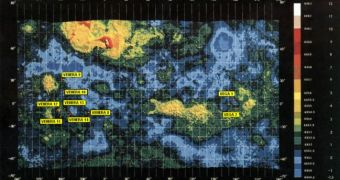Between 1961 and 1985, the Soviet space agency funded and conducted a series of space-exploration missions to Venus, in order to collect as many scientific data about the “morning star” as possible. Ten of the probes in the Venera program successfully landed on the surface of the planet and relayed data back to the Mission Control, while 13 others beamed back information from Venus' atmosphere. Now, the Russian space agency RosCosmos is, apparently, planning to pick up from where its predecessor left off, and then continue to explore the planet with a new series of space probes, the BBC News reports.
The Moscow-based space research institute IKI hosted last week an international space conference, as a means to attract international attention on a new exploratory mission to Venus, which it hopes to conduct alongside astronomers and other scientists in Europe and the United States. The official launch date for the new mission was scheduled for 2016, IKI representatives say. “The goal of this conference was to consolidate our and European scientists' ideas and determine what approaches toward this project we could use,” the leader of the Venus project at IKI, Oleg Korablev, explains.
“We want this mission to be as cutting edge as possible. At this day and age, this is not easy even for a very rich country, therefore we understand that this mission has to be co-operative,” IKI leading planetary scientist Ludmila Zasova says. The expert helped organize the new Moscow conference. Plans regarding the proposed Venera-D mission include an orbiter, several balloons, possibly a lander, and even a groundbreaking “wind-flyer,” to be flown through the acid-laden mist that surrounds the planet's surface. In spite of the technical and financial issues still to tackle, the response to the idea was good.
“What surprised me was the level of dedication that Russians [put] into this mission. Questions remain of when exactly it is going to fly and what it is going to contain,” European Space Agency (ESA) scientist Hakan Svedhem says. The expert is a team member for the Venus Express mission, controlling an orbiter around the “morning star.” “The Russian space science research budget has been expanding quite dramatically for a number of years, and I'm confident there will be room for this mission. We are in the very early stage, but I am sure many Europeans will be involved in the end in this mission,” he concludes.

 14 DAY TRIAL //
14 DAY TRIAL //